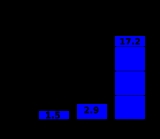
Complications of traumatic brain injury
Overview
Traumatic brain injury
(TBI, physical trauma
to the brain) can cause a variety of complications, health effects that are not TBI themselves but that result from it. The risk of complications increases with the severity of the trauma; however even mild traumatic brain injury can result in disabilities that interfere with social interactions, employment, and everyday living. TBI can cause a variety of problems including physical, cognitive, emotional, and behavioral complications.
Generally, there are six abnormal states of consciousness that can result from a TBI:
Traumatic brain injury
Traumatic brain injury , also known as intracranial injury, occurs when an external force traumatically injures the brain. TBI can be classified based on severity, mechanism , or other features...
(TBI, physical trauma
Physical trauma
Trauma refers to "a body wound or shock produced by sudden physical injury, as from violence or accident." It can also be described as "a physical wound or injury, such as a fracture or blow." Major trauma can result in secondary complications such as circulatory shock, respiratory failure and death...
to the brain) can cause a variety of complications, health effects that are not TBI themselves but that result from it. The risk of complications increases with the severity of the trauma; however even mild traumatic brain injury can result in disabilities that interfere with social interactions, employment, and everyday living. TBI can cause a variety of problems including physical, cognitive, emotional, and behavioral complications.
Generally, there are six abnormal states of consciousness that can result from a TBI:
- StuporStuporStupor is the lack of critical cognitive function and level of consciousness wherein a sufferer is almost entirely unresponsive and only responds to base stimuli such as pain. This is often mistaken for delirium and treated with Haldol and or other anti-psychotic drugs...
is a state of partial or near complete unconsciousness in which the patient is lethargic, immobile, and has a reduced response to stimuli. - ComaComaIn medicine, a coma is a state of unconsciousness, lasting more than 6 hours in which a person cannot be awakened, fails to respond normally to painful stimuli, light or sound, lacks a normal sleep-wake cycle and does not initiate voluntary actions. A person in a state of coma is described as...
is a state in which the patient is totally unconscious and cannot be aroused even with strong stimuli. - Persistent vegetative statePersistent vegetative stateA persistent vegetative state is a disorder of consciousness in which patients with severe brain damage are in a state of partial arousal rather than true awareness. It is a diagnosis of some uncertainty in that it deals with a syndrome. After four weeks in a vegetative state , the patient is...
is a condition in which awake patients are unconscious and unaware of their surroundings and the cerebral cortex is not functioning.
Discussions

